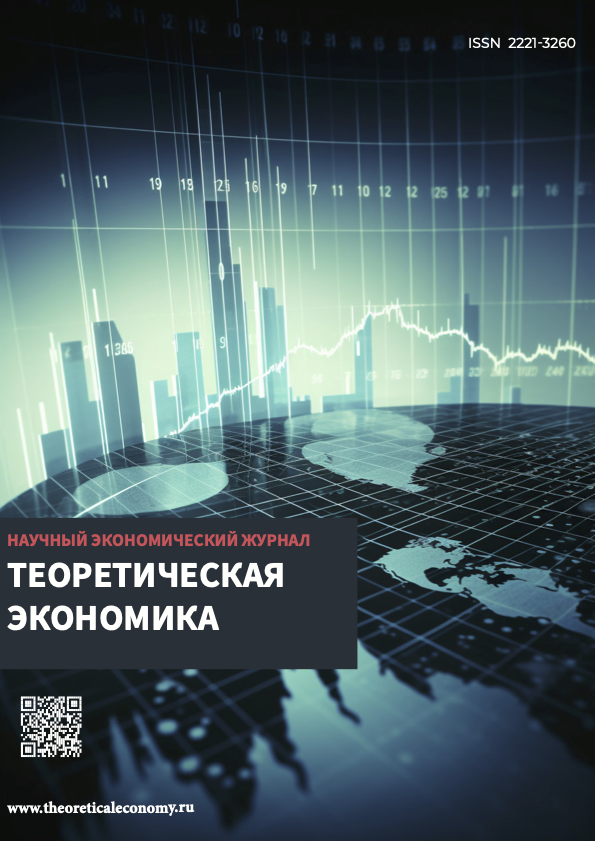Moscow, Moscow, Russian Federation
Moscow, Moscow, Russian Federation
The article presents an analysis of Iraq's foreign trade in commodity and geographical aspects, including the digital component. The purpose of the study is to analyze the current features of the development of Iraq's foreign trade and ways to overcome the existing imbalances in it. The relevance of the work lies in the study and identification of the features of the current structure of Iraq's foreign trade, as well as the theoretical systematization and empirical generalization of the transformations existing in this area. The novelty of the article consists in the study of a relatively poorly studied country that is under difficult conditions of sanctions pressure, the preservation of financial and economic problems in general, the solution of which can contribute to the increase in the efficiency of foreign trade, including the development of digital trade. The article analyzes a new trend in Iraq's foreign trade – e-commerce, which is developing within the global digital mainstream. The method of comparisons and visualization, index analysis, institutional method was used. The conducted index analysis confirms the presence of commodity imbalances and the imbalance of trade flows in the conditions of the continuing model of foreign trade. It is proved that the continuing model of Iraq's foreign trade is exhaustible and inefficient, especially given the rising costs of producing exports (oil), and the need for its transformation has become vital. It is shown that the state seeks to increase the role of regional partners in the foreign trade sphere in the last decade. The growth of Iraq's electronic foreign trade in goods and services in value terms has been recorded. It is established that the progress achieved in the digital segment of foreign trade is ensured by a number of factors that will contribute to the further development of digital trade. Obstacles to the development of electronic commerce in Iraq – economic, financial, legal - have been identified. The growing role of regional foreign trade partners in the digital segment of Iraq's foreign trade has been established. The authors substantiate the need to expand the digital foreign trade of Iraq, including due to its geography, which, other things being equal, will contribute to the elimination of foreign trade imbalances.
: Iraq; international trade; structure; balance; imbalances; electronic commerce; cybersecurity.
1. Aydrus I.A.Z., Semicheva V.O., Berezina A.E. Vliyanie ekonomicheskih sankciy na Irak // Nauchnoe obozrenie. Seriya 1: Ekonomika i pravo. 2015. №6. S. 108–118.
2. Ahmed N.N.A. Vneshnyaya torgovlya Iraka i ee sovremennye osobennosti // Rossiyskiy vneshneekonomicheskiy vestnik. 2022. № 2. S. 75–82. DOI:https://doi.org/10.24412/2072-8042-2022-2-75-82
3. Diabate V., Holina V.N., Frolova E.D. Izmenenie struktury vneshney torgovli afrikanskih stran v usloviyah usileniya regionalizacii mirovoy ekonomiki // Ekonomika regiona. 2020. T. 16. № 1. S. 242–256. DOI:https://doi.org/10.17059/2020-1-18
4. Dolgov S.I., Savinov Yu.A., Kirillov V.N., Taranovskaya E.V. Vozmozhnosti protivodeystviya sankciyam v mezhdunarodnoy torgovle // Rossiyskiy vneshneekonomicheskiy vestnik. 2022. № 4. S. 36–54. DOIhttps://doi.org/10.24412/2072-8042-2022-4-36-54
5. Mezhdunarodnaya torgovlya / Hasbulatov R.I., Podbiralina G.V., Kuznecova G.V., Hasbulatov O.R., Achalova L.V., Byasharova A.R., Spartak A.N., Savina N.P., Zolotova E.V., Tyurina O.A., Zaharova N.V. Uchebnik / Ser. 61 Bakalavr i magistr. Akademicheskiy kurs. (2-e izd., per. i dop) Moskva, 2018. 405 s.
6. Smirnov E.N. Mezhdunarodnaya torgovlya: signal ustoychivogo vosstanovleniya i paradoksy regulirovaniya // Mezhdunarodnaya torgovlya i torgovaya politika. 2022. T. 8. № 1 (29). S. 9–26. DOIhttps://doi.org/10.21686/2410-7395-2022-1-9-26
7. Hasbulatov R.I., Byasharova A.R. XXI vek: nekotorye osobennosti mirovogo ekonomicheskogo razvitiya // Mezhdunarodnaya ekonomika. 2019. № 11. S. 6–21.
8. Hasbulatov R.I., Byasharova A. R. Vysokotehnologichnye otrasli v mirovoy ekonomike: sovremennye tendencii // Rossiya i Aziya. 2021. №2 (16). S. 64–77.
9. Chaplyuk V.Z., Al'zhdalabi H.H. Stanovlenie i razvitie sovremennyh torgovo-ekonomicheskih svyazey Iraka // Finansovaya ekonomika. 2019. № 4. S. 767–771.
10. Shkvarya L.V., Frolova E.D. Komparativnyy analiz razvitiya vneshney torgovli v cifrovom segmente po regionam mira // Ekonomika regiona. 2022. T. 18. №2. S. 479–493. DOIhttps://doi.org/10.17059/ekon.reg.2022-2-13
11. Shkvarya L.V., Rodin S.I. Cifrovaya ekonomika v SSAGPZ: sovremennoe sostoyanie i problemy // Ekonomika i predprinimatel'stvo. 2020. № 2 (115). S. 188–191.
12. Shuklina Z.N. Nacional'naya resursoobespechennost': neosporimaya cennost', bozhestvennoe providenie, resursnoe proklyatie ili potencial razvitiya ekonomiki // Othody i resursy. 2018. Tom 5. №3. 10 s.
13. Mounir Belloumi, Kamel Touati. Do FDI Inflows and ICT Affect Economic Growth? // Sustainability. 2022. Vol. 14. Is. 10:6293. DOI:https://doi.org/10.3390/su14106293
14. Shkvarya L.V., Ahmed N.N.A. Iraq in the regional economy and social sphere and the problems of reconstruction // Aziya i Afrika segodnya. 2022. № 8. S. 34–41. DOIhttps://doi.org/10.31857/S032150750021325-9
15. UNCTAD. [Elektronnyy resurs] – Rezhim dostupa: URL:https://unctadstat.unctad.org/wds/TableViewer/tableView.aspx?ReportId=96 (data obrascheniya 25.08.2023).
16. Zhun Zheng, Lisovskiy A., Vasa L., Strielkowski W., Yang Yanwu. Resources curse and sustainable development perspective: Fresh evidence from oil rich countries // Resources Policy. 2023. Vol. 85, Part A, August. 103698. DOIhttps://doi.org/10.1016/j.resourpol.2023.103698
 This work is licensed under Creative Commons Attribution-NonCommercial-NoDerivatives 4.0 International
This work is licensed under Creative Commons Attribution-NonCommercial-NoDerivatives 4.0 International












